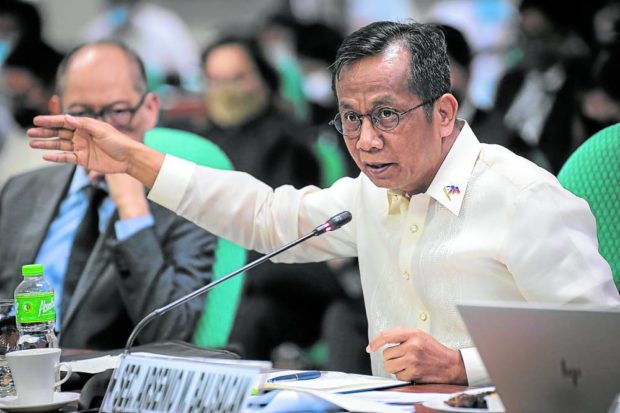Neda: High agri production, more food, energy supplies needed to combat inflation

Neda’s Arsenio Balisacan — Senate PRIB file photo
MANILA, Philippines – The National Economic and Development Authority (Neda) stated that higher agricultural productivity, food supply augmentation, and ensuring energy security are the major priorities of the government to combat the accelerated inflation rate.
Philippine inflation increased to 8.7 percent in January this year, according to the Philippine Statistics Authority.
READ: Philippine inflation rose to 8.7% in January
“As part of the administration’s 8-point agenda and the Philippine Development Plan (PDP) 2023-2028, the government is implementing measures to ease price pressures and cushion the impact of inflation, especially on basic commodities,” Neda Secretary Arsenio Balisacan said in a statement.
He claimed that Neda has been collaborating closely with agencies, particularly in modernizing the nation’s agriculture, agribusiness, and ensuring energy security in order to ensure the timely and effective implementation of the strategies and programs outlined in PDP.
Article continues after this advertisementThe head of Neda stated that the government is taking steps to ensure that changes in food prices remain in line with its goals for both food security and inflation.
Article continues after this advertisementThe increasing supply through temporary relaxing of import restrictions, price monitoring, and focused social assistance are some short-term approaches, said Neda.
Meanwhile, priority areas in the medium to long term include improving agricultural production and advancing the energy transition and development program.
“Our measures are meant to balance the interests among local food producers, consumers, and the overall economy,” Balisacan said.
“As laid out in Chapter 5 of the Philippine Development Plan 2023-2028, a whole-of-society approach is crucial in modernizing agriculture and agribusiness, with both the government and private sector working hand-in-hand to enhance the efficiency of agriculture, forestry, and fisheries production,” he added.
Due to a slower-than-anticipated global recovery and declining local demand, the economic managers expect that inflation will moderate in 2023 and 2024.
This year, the government is expecting to see the effects of the policy rate increases made by the Bangko Sentral ng Pilipinas. – Kimberly D. Albaño, INQUIRER.net intern